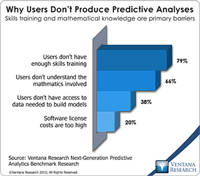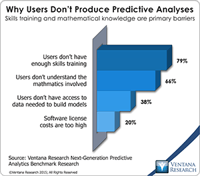Predictive analytics is a rewarding yet challenging subject. In our benchmark research on next-generation predictive analytics at least half the participants reported that predictive analytics allows them to achieve competitive advantage (57%) and create new revenue opportunities (50%). Yet even more participants said that users of predictive analytics don’t have enough skills training to produce their own analyses (79%) and don’t understand the mathematics involved (66%). (In the term...
Read More
Topics:
Data Science,
Business Analytics,
Business Intelligence,
Business Performance,
Cloud Computing,
Uncategorized
I recently attended the SAS Analyst Summit in Steamboat Springs, Colo. (Twitter Hashtag #SASSB) The event offers an occasion for the company to discuss its direction and to assess its strengths and potential weaknesses. SAS is privately held, so customers and prospects cannot subject its performance to the same level of scrutiny as public companies, and thus events like this one provide a valuable source of additional information.
Read More
Topics:
Big Data,
Predictive Analytics,
SAS,
Analytics,
Business Analytics,
Business Collaboration,
Business Intelligence,
Business Performance,
Information Applications,
Information Management,
Uncategorized,
Visualization
I want to share my observations from the recent annual SAS analyst briefing. SAS is a huge software company with a unique culture and a history of success. Being privately held SAS is not required to make the same financial disclosures as publicly held organizations, it released enough information to suggest another successful year, with more than $2.7 billion in revenue and 10 percent growth in its core analytics and data management businesses. Smaller segments showed even higher growth rates....
Read More
Topics:
Big Data,
Predictive Analytics,
SAS,
Analytics,
Business Analytics,
Business Intelligence,
Business Performance,
Cloud Computing,
Strata+Hadoop
For most people involved with business intelligence (BI), these are exciting times. Using BI to improve business processes continues to motivate organizations to invest in BI. The focus on BI also empowers business analytics and can be rented in the cloud computing model of accessing software. New technologies are adding dimensions to BI and creating both excitement and confusion for enterprises implementing them. We offer a variety of accomplished research that can help organizations overcome...
Read More
Topics:
Mobile Business Intelligence,
Predictive Analytics,
Sales Performance,
Social Media,
Supply Chain Performance,
Business Analytics,
Business Intelligence,
Business Performance,
Collaboration,
Customer & Contact Center,
Financial Performance,
Information Management,
Operational Intelligence,
Workforce Performance
My colleague Mark Smith and I recently attended data integration vendor Informatica’s annual industry analyst event. The company offered some impressive numbers regarding growth and profitability over the years, with 30 consecutive quarters of growth even during the recent recession. Through acquisition and its own research and development activities Informatica now has a broad portfolio of products. It includes data integration and supporting migration, replication and synchronization needs,...
Read More
Topics:
Big Data,
Sales Performance,
Social Media,
Supply Chain Performance,
Business Analytics,
Business Intelligence,
Business Performance,
Cloud Computing,
Customer & Contact Center,
Data Integration,
Financial Performance,
Informatica,
Information Management,
Workforce Performance
Revolution Analytics recently announced the winners of its “Applications of R in Business” contest. Revolution Analytics has built a business around supporting R, an open source statistical software package, and extending it with features it licenses to customers. I served as a judge in the contest. Since I was in the midst of analyzing the data for our predictive analytics benchmark research, I was interested to see how the contestants applied predictive analytics techniques to specific...
Read More
Topics:
Predictive Analytics,
Sales Performance,
Social Media,
Supply Chain Performance,
Business Analytics,
Business Intelligence,
Business Performance,
Customer & Contact Center,
Financial Performance,
Workforce Performance
When it comes to technology, debates about whether a particular name suits its category are rampant. Here is a link to one such argument about the term “big data” from Curt Monash, an analyst whom I respect a great deal. This debate rages in the Twittersphere also, as in this comment from Neil Raden, another analyst I respect, suggesting that “big data is a marketing term … imprecise by design.” Another term I’ve encountered resistance to recently is “predictive analytics.” See: (“Revolution...
Read More
Topics:
Predictive Analytics,
Sales Performance,
Social Media,
Supply Chain Performance,
Business Analytics,
Business Intelligence,
Business Performance,
Cloud Computing,
Customer & Contact Center,
Financial Performance,
Workforce Performance
MicroStrategy, one of the largest independent vendors of business intelligence (BI) software, recently held its annual user conference, which I attended with some of my colleagues and more than 2,000 other attendees. At this year’s event, the company emphasized four key themes: mobility, cloud computing, big data and social media. In this post, I’ll assess what MicroStrategy is doing in each of the first three areas. My colleague, Mark Smith, covered MicroStrategy’s social intelligence efforts...
Read More
Topics:
Big Data,
MicroStrategy,
Mobile,
Predictive Analytics,
Sales Performance,
Social Media,
Supply Chain Performance,
Business Analytics,
Business Intelligence,
Business Performance,
Cloud Computing,
Customer & Contact Center,
Financial Performance,
Workforce Performance,
Strata+Hadoop
We recently published the results of our benchmark research on Big Data to complement the previously published benchmark research on Hadoop and Information Management. Ventana Research undertook this research to acquire real-world information about levels of maturity, trends and best practices in organizations’ use of large-scale data management systems now commonly called Big Data. The results are illuminating.
Read More
Topics:
Big Data,
Sales Performance,
Social Media,
Supply Chain Performance,
Business Analytics,
Business Intelligence,
Business Performance,
Customer & Contact Center,
Financial Performance,
In-memory,
Workforce Performance
Rather than make predictions for 2012, which are everywhere right now, I want to look back at some of the surprising events of 2011. I think it’s worth considering what happened that wasn’t expected and what these things might tell us about the information technology market. Here, in no particular order, are the most important ones I see.
Read More
Topics:
Big Data,
Mobile,
Predictive Analytics,
Sales Performance,
Social Media,
Supply Chain Performance,
Business Analytics,
Business Intelligence,
Business Performance,
Customer & Contact Center,
Financial Performance,
Workforce Performance













